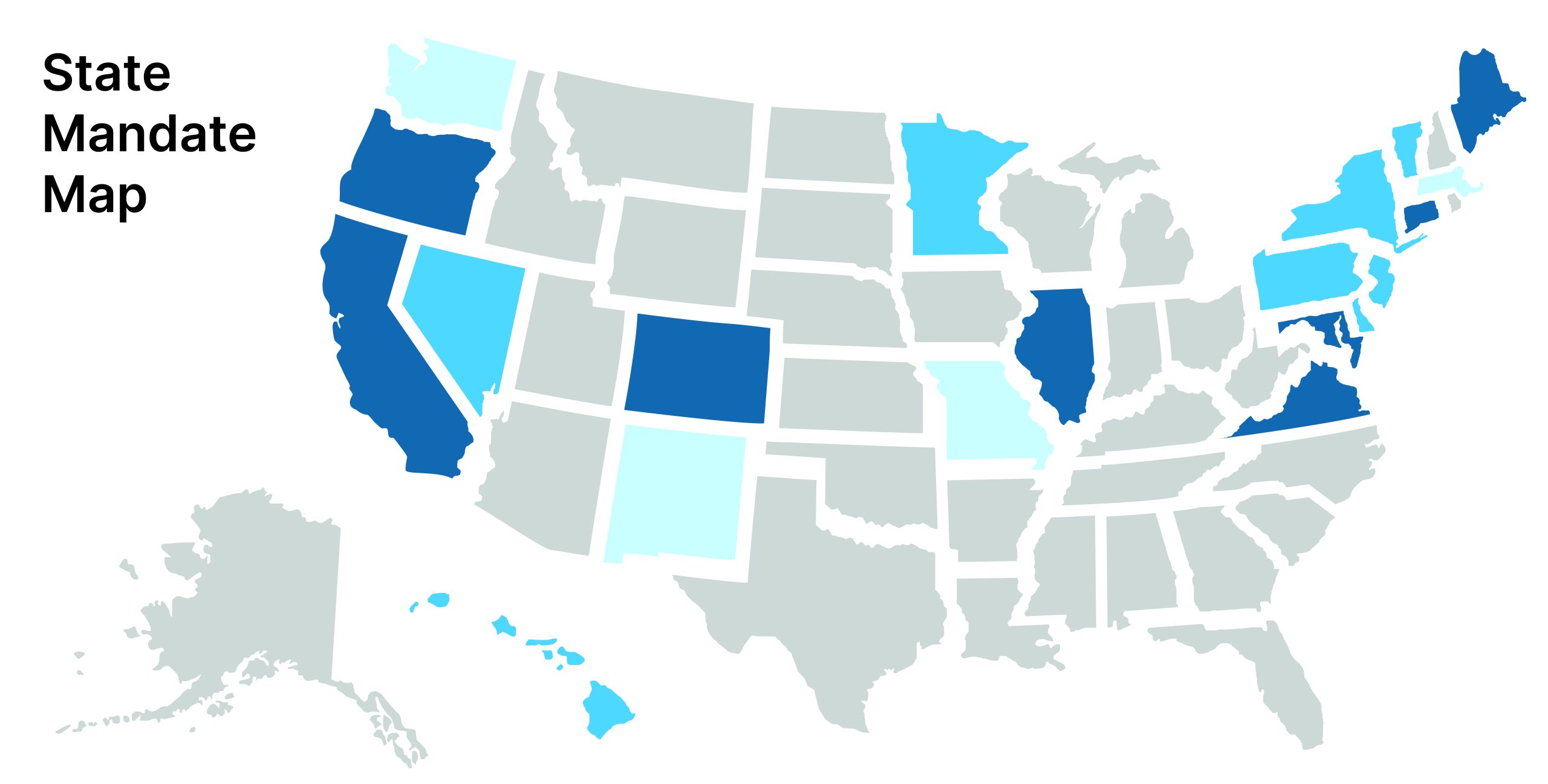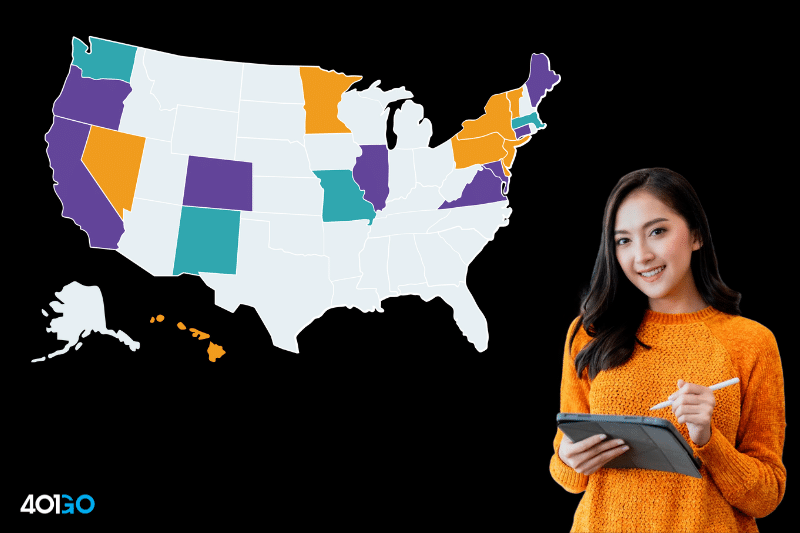Several states require that employers meeting certain standards offer their employees retirement savings benefits. Here, you can learn which states these mandates apply to.
Let our experts show you how 401GO offers a far superior alternative to state-provided options.


State Mandates
Learn Your Alternatives
Although the details vary from state to state, most are requiring businesses with 5 employees or more to offer a retirement benefit to their employees.
Businesses can choose to use the state-managed program, which is usually a payroll-deduction Roth IRA, or purchase a qualifying alternative privately. Either way, a decision must be made that affects employees.
About half of affected businesses are choosing a private option, and among those that use the state plans, many later change their minds.
The retirement landscape has changed drastically for small businesses, and most can afford a much better benefit than they imagined. Take a look at the details for your state and compare it to the 401GO alternative.

California
Active plan, final deadline 12/31/2025. Download Comparison
Colorado
Active plan, all deadlines have passed. Download Comparison
Connecticut
Active plan, add deadlines have passed. Download Comparison
Delaware
Active plan, launched July 1, 2024. Download Comparison
Hawaii
Legislation signed. Opt-in (not auto-enroll) for employees. Expected to launch July 2024.
Illinois
Active plan, final deadline 11/2023. Download Comparison
Maine
Active plan, final deadline 4/2024. Plan to partner with Colorado in the future. Download Comparison
Maryland
Active plan, no deadlines established. Download Comparison
Massachusetts
Active, voluntary MEP for non-profits only.
Minnesota
Legislation signed, launch date expected in 2024 or 2025.
Missouri
Voluntary MEP, expected to launch September 2025.
Nevada
Legislation passed, expected to launch July 1, 2025.
New Jersey
Active plan, final deadline 11/2024.
New Mexico
Active, voluntary plan. Partnership with Colorado expected to launch July 2024, will still be voluntary.
New York
Plan was expected to launch in 2022, but it is not live yet and no deadlines have been established. Download Comparison
Oregon
Active plan, all deadlines have passed. Download Comparison
Pennsylvania
Legislation passed, waiting to be signed. Expected to launch 2025.
Rhode Island
Legislation signed, launch date not announced.
Vermont
Legislation signed, expected to launch 2025.
Virginia
Active plan for businesses with 25+ employees, deadline 2/15/2024. Download Comparison
Washington
Currently offering a voluntary marketplace; will institue mandates like other states. Legislation signed, with a program to launch January 2027.
State Mandates
Download the free guide to secure choice retirement plans.
With secure choice plans being offered in more and more states, it’s important for businesses to understand enough details to make an informed decision. Retirement plan decisions can have far-reaching consequences for both employer and employee.
State mandated retirement plans are typically Roth IRAs, which have different rules and regulations than 401(k) plans.
Plan designs and mandates vary from state to state, but most have some basic similarities that will help you make a smart choice.
This guide will help you know what to consider when choosing a retirement benefit.


Client Testimonials
See What Our Clients Say
Frequently Asked Questions
Questions? We’ve Got Answers
Is it legally required in all U.S. states for employers to provide retirement plans to employees?
In most states, employers are not required to offer retirement plans. However, a few states do have these requirements, and several more are working on legislation. See the list above for details.
What counts as an employer retirement plan?
While 401(k)s are the most common employer-sponsored retirement plan, other options include SIMPLE IRA plans, SEP plans, profit-sharing plans, cash-balance plans, and stock ownership plans. Each state has rules about what types of plans will count as an exemption from the state plan, so it’s best to consult your state regulations.
Do employees like the state plans?
Obviously, opinions vary. A payroll-deduction IRA is more powerful than a private IRA, and both of those are better than no retirement option at all. However, many bad reviews of the state plans can be found, and most of them focus on communication and education issues and poor support.
By contrast, 401GO has a 4.8-star rating and leads the industry for customer support.
Do employees have to participate in state plans?
Most states offer auto-enrollment IRA plans, meaning employees will be automatically added to the plan, and contributions will be taken from their paychecks. However, employees are always able to opt out of the plan, and stop and start contributions anytime.
Many 401(k) plans also have auto-enrollment features, always with the ability to opt out, so education and communication with employees is important.
What are the penalties for not offing a retirement plan?
These penalties vary from state to state. Those states that have mandates in place will almost always have penalties attached for those who don’t comply. It’s best to consult your state to determine the exact penalties and deadlines.
News and Blog Articles
See Our Recent Blog Posts
Let’s Get Started
Start Your Journey with 401GO
401GO offers 401(k) retirement savings plans that are far superior to state mandate options. How much better? Find out for yourself by beginning the plan setup process right now.














